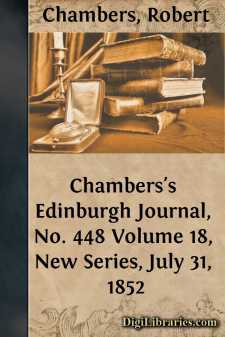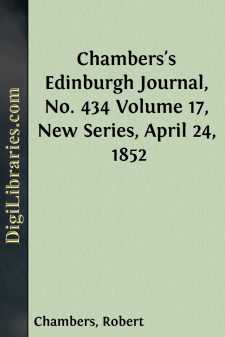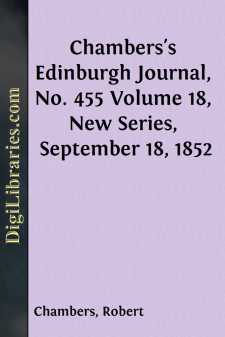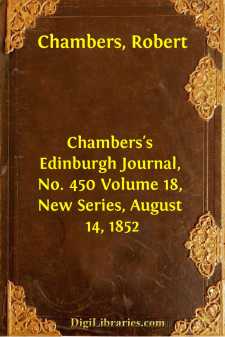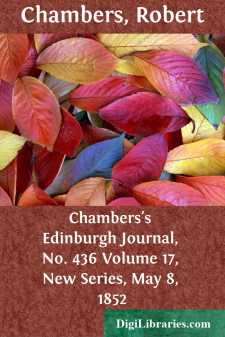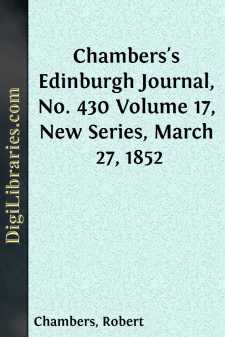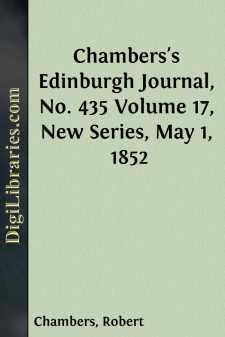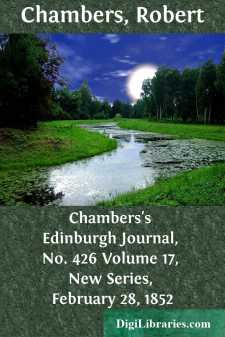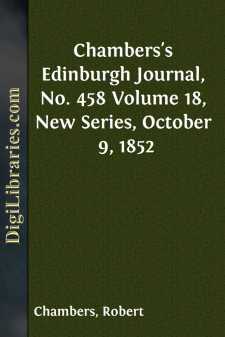Categories
- Antiques & Collectibles 13
- Architecture 36
- Art 48
- Bibles 22
- Biography & Autobiography 813
- Body, Mind & Spirit 142
- Business & Economics 28
- Children's Books 14
- Children's Fiction 11
- Computers 4
- Cooking 94
- Crafts & Hobbies 4
- Drama 346
- Education 46
- Family & Relationships 57
- Fiction 11829
- Games 19
- Gardening 17
- Health & Fitness 34
- History 1377
- House & Home 1
- Humor 147
- Juvenile Fiction 1873
- Juvenile Nonfiction 202
- Language Arts & Disciplines 88
- Law 16
- Literary Collections 686
- Literary Criticism 179
- Mathematics 13
- Medical 41
- Music 40
- Nature 179
- Non-Classifiable 1768
- Performing Arts 7
- Periodicals 1453
- Philosophy 64
- Photography 2
- Poetry 896
- Political Science 203
- Psychology 42
- Reference 154
- Religion 513
- Science 126
- Self-Help 84
- Social Science 81
- Sports & Recreation 34
- Study Aids 3
- Technology & Engineering 59
- Transportation 23
- Travel 463
- True Crime 29
Chambers's Edinburgh Journal, No. 448 Volume 18, New Series, July 31, 1852
by: Robert Chambers
Description:
Excerpt
BOOK-WORSHIP.
A book belongs in a peculiar manner to the age and nation that produce it. It is an emanation of the thought of the time; and if it survive to an after-time, it remains as a landmark of the progress of the imagination or the intellect. Some books do even more than this: they press forward to the future age, and make appeals to its maturer genius; but in so doing they still belong to their own—they still wear the garb which stamps them as appertaining to a particular epoch. Of that epoch, it is true, they are, intellectually, the flower and chief; they are the expression of its finer spirit, and serve as a link between the two generations of the past and the future; but of that future—so much changed in habits, and feelings, and knowledge—they can never, even when acting as guides and teachers, form an essential part: there is always some bond of sympathy wanting.
A single glance at our own great books will illustrate this—books which are constantly reprinted, without which no library can be tolerated—which are still, generation after generation, the objects of the national worship, and are popularly supposed to afford a universal and unfailing standard of excellence in the various departments of literature. These books, although pored over as a task and a study by the few, are rarely opened and never read by the many: they are known the least by those who reverence them most. They are, in short, idols, and their worship is not a faith, but a superstition. This kind of belief is not shaken even by experience. When a devourer of the novels of Scott, for instance, takes up Tom Jones, he, after a vain attempt to read, may lay it down with a feeling of surprise and dissatisfaction; but Tom Jones remains still to his convictions 'an epic in prose,' the fiction par excellence of the language. As for Clarissa Harlowe and Sir Charles Grandison, we have not heard of any common reader in our generation who has had the hardihood even to open the volumes; but Richardson as well as Fielding retains his original niche among the gods of romance; and we find Scott himself one of the high-priests of the worship. When wandering once upon the continent, we were thrown for several days into the company of an English clergyman, who had provided himself, as the best possible model in description, with a copy of Spenser; and it was curious to observe the pertinacity with which, from time to time, he drew forth his treasure, and the weariness with which in a few minutes he returned it to his pocket. Yet our reverend friend, we have no doubt, went home with his faith in Spenser unshaken, and recommends it to this day as the most delightful of all companions for a journey.
In the present century, the French and German critics have begun to place this reverential feeling for the 'classics' of a language upon a more rational basis. In estimating an author, they throw themselves back into the times in which he wrote; they determine his place among the spirits of his own age; and ascertain the practical influence his works have exercised over those of succeeding generations....


